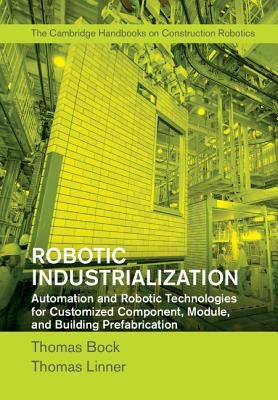Cambridge University Press
Robotic Industrialization: Automation and Robotic Technologies for Customized Component, Module, and Building Prefabrication
Robotic Industrialization: Automation and Robotic Technologies for Customized Component, Module, and Building Prefabrication
Couldn't load pickup availability
Author: Thomas Bock, Thomas Linner
Publisher: Cambridge University Press
Published: 08/10/2015
Pages: 260
Binding Type: Hardcover
Weight: 1.45lbs
Size: 10.30h x 7.30w x 1.20d
ISBN: 9781107076396
About the Author
Bock, Thomas: - Thomas Bock is a professor of building realization and robotics at Technische Universität München (TUM). His research has focussed for thirty-five years on automation and robotics in building construction, from the planning, prefabrication, on-site production and utilization phases to the reorganization and deconstruction of a building. He is a member of several boards of directors of international associations and is a member of several international academies in Europe, the Americas and Asia. He consulted several international ministries and evaluates research projects for various international funding institutions. He holds honorary doctor and professorship degrees. Professor Bock serves on several editorial boards, heads various working commissions and groups of international research organizations, and has authored or coauthored more than four hundred articles.Linner, Thomas: - Thomas Linner is a postdoctoral researcher in building realization and robotics and a research associate at Technische Universität München (TUM). He completed his dissertation (Dr.-Ing.) in 2013 in the field of automation and mass customization in construction with a particular focus on automated/robotic on-site factories. Dr Linner is a specialist in the area of automated, robotic production of building 'products' as well as in the conception and performance enhancement of those products through the embedding of advanced technology (service robots, microsystems technology). Today, more and more, issues related to innovation management are becoming key topics in his research. Dr Linner is a frequently invited speaker at universities such as the University of Tokyo and Cambridge University.
Share


